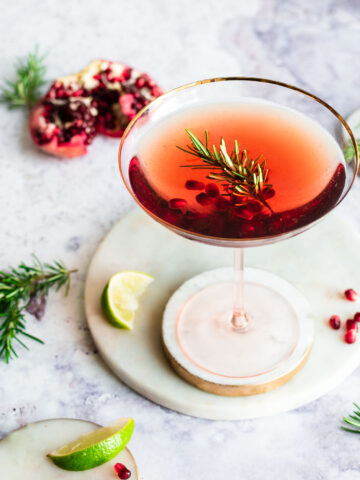Bergamot orange is a gorgeous winter fruit, bright as the sun, with a striking punch of acidity underpinned notes of flowers and black pepper. Its complexity means that it brings big flavor to whatever you happen to make, and this simple bergamot orange syrup is one of the easiest ways to both use and preserve the fruit.
Jump to Recipe | What is it? | What's in it? | Tips | Variations | Common Questions

What is it?
Bergamot orange syrup is a simple syrup made with sugar and bergamot oranges - a type of citrus fruit with a notably sour flesh and a deeply fragrant, floral aroma. It hits the tongue with the striking acidity of a lemon, but finishes on a more elusive note of flowers. Botanists believe it's a natural cross between bitter oranges and lemons.
Like other citrus fruits, it's rich in various antioxidants, such as hesperidin, which is strongly anti-inflammatory (1) and supports the nerves (2). Bergamot orange in particular supports cellular health, the heart, and metabolic health (3).
Essential oils gives the fruit its distinct flavor, and those naturally occurring oils also make their way to this syrup giving it a sweet pepperiness and touch of orange flower. These same essential oils are used in aromatherapy to ease feelings of anxiety and stress (4).
What's in it?
To make the syrup you'll need fresh bergamot oranges, which are in season in late winter and early spring. To that you'll add a small amount of water and about a cup of sugar. Sugar both sweetens the syrup and helps to preserve the bergamot juice, but you can also use honey as an alternative.
In this recipe, we'll use the whole fruit (including the rind). It's easier to make, and lends a subtle bitter note to the syrup - increasing the complexity of the flavor and compounding its medicinal benefits.
Where to find bergamot oranges
Bergamot oranges are a specialty citrus fruit grown throughout the Mediterranean, but in limited quantities in the United States. You may be able to find them at farmers markets in citrus-growing areas.
But your best bet is to order them online. I ordered ours from Pearson Ranch.

Tips for making this recipe
Making bergamot orange syrup is simple, requiring only three steps. For this recipe, you'll use the whole orange, including the rind. As such, you begin by chopping it (rind and all) into 1-inch pieces before tossing it in a saucepan with sugar and water. Then strain into a bottle and store it.
- Wash the fruit well. Since you're using the whole fruit, you want to remove any dirt, debris or residue that might adhere to the rind.
- Turn the heat down after you bring it to a boil, that way you preserve as much of the fruit's essential oils while still allowing it to cook a sufficient amount of time.
- Allow the fruit to cook until the rind turns glossy and the flesh falls apart, about 20 minutes. You'll know its released most of its flavor this way.
- Press the fruit through the strainer to extract as much liquid as possible.
- Add herbs and spices for flavor. Black pepper pairs beautifully with bergamot orange as does lemongrass, coriander, rosemary, and juniper.
- Use only a little at a time, about 1 tablespoon is usually sufficient per person.
Variations
Use honey instead of sugar by substituting ¾ cup honey for 1 cup sugar. Keep in mind that honey has a strong flavor on its own that may mask the more delicate flavors of bergamot oranges. So, use a mild, neutral-flavored honey for best results.
Use other citrus fruits if you can't find bergamot orange. A combination of grapefruits, pomelos, lime, or lemon would work well in this recipe too.
Add herbs and spices when you add the oranges. Bergamot orange pairs nicely with many spices including rosemary, lemongrass, black pepper, pink peppercorns, coriander, and even star anise.
If you want a less bitter syrup, peel the colorful zest with a vegetable peeler (discarding the white pith), and then juice the fruit. Add both to your saucepan along with water and sugar. Simmer only until the sugar dissolves, and then strain and bottle.
Common Questions
How do you use it? Use about 1 tablespoon per serving. You can add it to homemade yogurt, ice cream, or fresh berries. You can also dilute it with still or sparkling water to make a drink similar to lemonade, or add a bit to a homemade cocktail of vodka or gin.
How long does it keep? Keep the syrup in a tightly sealed glass bottle in the refrigerator for up to 1 month or in a freezer-safe container in the freezer for up to 3 months. You can also can the syrup by the water bath method, but reach out to your local extension office for recommended times.
Other winter fruit recipes you might like
Citations and Resources
- Tejada S, Pinya S, Martorell M, Capó X, Tur JA, Pons A, Sureda A. Potential Anti-inflammatory Effects of Hesperidin from the Genus Citrus. Curr Med Chem. 2018;25(37):4929-4945.
- Hajialyani M, Hosein Farzaei M, Echeverría J, Nabavi SM, Uriarte E, Sobarzo-Sánchez E. Hesperidin as a Neuroprotective Agent: A Review of Animal and Clinical Evidence. Molecules. 2019 Feb 12;24(3):648.
- Cappello AR, Dolce V, Iacopetta D, Martello M, Fiorillo M, Curcio R, Muto L, Dhanyalayam D. Bergamot (Citrus bergamia Risso) Flavonoids and Their Potential Benefits in Human Hyperlipidemia and Atherosclerosis: an Overview. Mini Rev Med Chem. 2016;16(8):619-29.
- Saiyudthong, S. and Marsden, C.A. (2011), Acute effects of bergamot oil on anxiety‐related behaviour and corticosterone level in rats. Phytother. Res., 25: 858-862.
- Han, X., Gibson, J., Eggett, D. L., and Parker, T. L. (2017) Bergamot (Citrus bergamia) Essential Oil Inhalation Improves Positive Feelings in the Waiting Room of a Mental Health Treatment Center: A Pilot Study. Phytother. Res., 31: 812– 816.










Leave a Reply